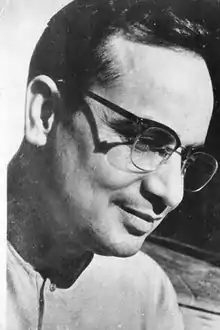Pandit Narendra Sharma
Pandit Narendra Sharma (28 February 1913 – 12 February 1989) was an Indian writer, poet and lyricist in Hindi language. He also wrote some songs for Indian Hindi cinema, like the title song for Satyam Shivam Sundaram (1979),[2][3] for which he also received a Filmfare Award nomination for Best Lyricist.
Pandit Narendra Sharma | |
|---|---|
 | |
| Born | 28 February 1913 Jahangirpur |
| Died | 12 February 1989 (aged 75)[1] Bombay |
| Occupation | poet, lyricist |
| Language | Hindi |
| Nationality | Indian |
| Notable awards | padma bushan |
Life and career
Pandit Narendra Sharma was born in Jahangirpur near Proposed International Airport Jewer, Greater Noida, District Gautam Buddh Nagar Uttar Pradesh in the National Capital Region. He did his undergraduate program and M.A in English Literature at Allahabad University.
Lata Mangeshkar the singer used to address him as her father while she was addressed as his daughter. In a documentary on Lata Mangeshkar produced and directed by Nasreen Munni Kabir for Britain's Channel 4 the singer has confessed that she learned a lot from pandithji and could negotiate many difficulties of life based on his advice.[4]
He published Abyudhay newspaper in 1934. He wrote songs for the movie, Aandhiyan.[5] He was founder of Vividh Bharati Seva of All India Radio.
Sharma wrote for more than hundred films and worked with almost all major music directors and singers. He was also the conceptual adviser of the popular TV Series Mahabharat, for which too he wrote songs. This was his last work, and on 12 February 1989, four months after the show went on-air, he died aged 76.
Bibliography
The following are the poems written by Narendra Sharma
- Kahani Kehte Kehte
- Paniharin
- Rathwan
- Swagatham
Filmography
- Hamari Baat (1943)
- Satyam Shivam Sundaram (1978)
- Aandhiyan (1952)
- Narasinha Avatar (1949)
- Matwala Shair (1947)
- Bhabhi Ki Chudiyan (1961)
- Malti Madhav (1951)
- Jwar Bhata (1944)[6]
References
- Land and People of Indian States and Union Territories: In 36 Volumes. Maharashtra, 2006, p. 675
- "Celebrating World Dance Day - Times Of India". Articles.timesofindia.indiatimes.com. 26 April 2011. Retrieved 28 December 2011.
- Sukumaran, Shradha (14 June 2009). "Voice of India". Mid-day.com. Retrieved 28 December 2011.
- "YouTube". Retrieved 31 August 2016.
- "Memories of an uncompromising Ustad". Indian Express. Retrieved 28 December 2011.
- "aaise hai.n sukh sapan hamaare". Retrieved 31 August 2016.
External links
- Pandit Narendra Sharma on IMDb
- Profile and Poems at anubhuti-hindi.org
- Pandit Narendra Sharma, Life and works, at study (Hindi)